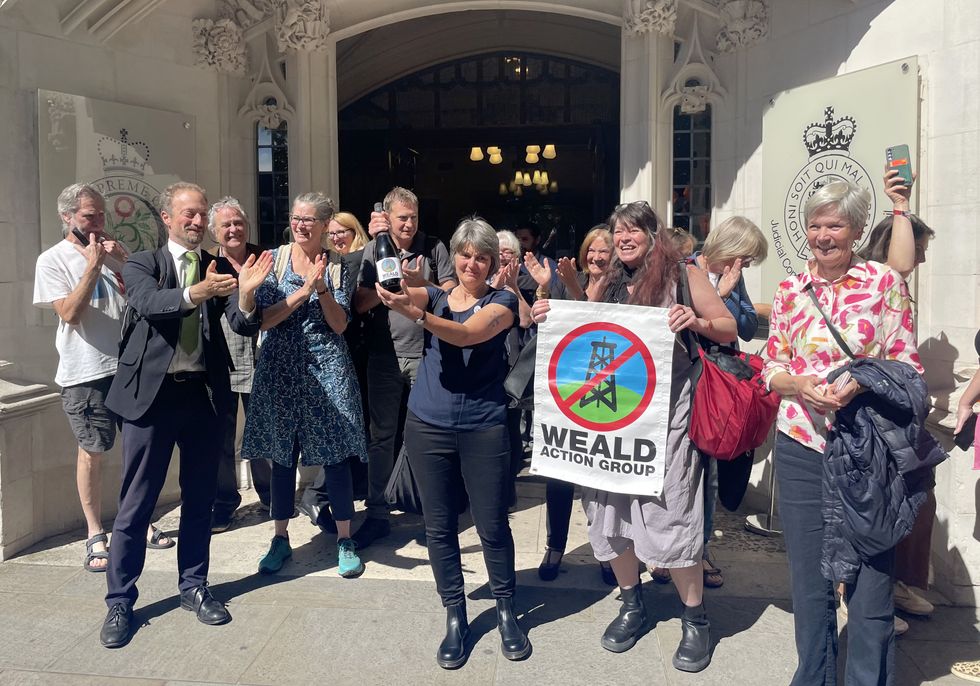Britain's future oil production AT RISK - Warning issued after landmark court ruling
Environmental campaigner Sarah Finch outside the Supreme Court after today's ruling
The Supreme Court determined that fossil fuel emissions should be considered when granting planning permission for new oil and gas drilling sites
Don't Miss
Most Read
Trending on GB News
Britain may be banned from opening new oil wells following a Supreme Court ruling, a leading barrister has warned.
Stephen Barrett said that the UK's domestic energy production is at risk following a landmark ruling earlier today.
The Supreme Court determined that fossil fuel emissions should be considered when granting planning permission for new oil and gas drilling sites.
Environmentalist campaigner Sarah Finch challenged Surrey County Council’s decision to grant planning permission to expand an oil well site at Horse Hill, near Redhill in Surrey, in 2019.
Finch, acting on behalf of Weald Action Group, argued that the environmental impact assessment on the new sites should have taken into account the emissions produced later when the oil was burned.
The case reached the Supreme Court after she challenged an earlier Court of Appeal ruling that dismissed her case.
 Environmental campaigner Sarah Finch outside the Supreme Court after today's rulingPA
Environmental campaigner Sarah Finch outside the Supreme Court after today's rulingPAShe had previously lost in the High Court.
Surrey County Council argued that it did not need to take into account the “downstream” emissions when granting permission to new oil wells.
But this morning Supreme Court justices ruled three to two in favour of Finch’s appeal, overruling the planning permission.
Finch said that the decision had set a new legal precedent, stating: “It’s not just Horse Hill. In the future, every fossil fuel development project that’s of the size to meet environmental impact assessment requirements, they will have to assess the downstream emissions from when the fuel is burned.”
She added: “That is now the law. It’s going to make it a lot harder for anyone to open a new oil or coal field.
“And it has implications for some that have already been agreed but are subject to legal challenges.”
Finch, who campaigned against the oil wells for several years, closed her speech outside the Supreme Court by saying “in climate science we hear a lot about tipping points … things that accelerate global warming in an unpredictable, frightening way. I think today we’ve just seen a tipping point in the other direction.”
She added: “No longer will any planning authority be allowed to wave through fossil fuel production without fully considering the climate aspect.”
But barrister Stephen Barrett said the move put the courts at odds with the energy needs of British people.
“If the Supreme Court is right, then it is now the law to take the production of Carbon Dioxide into account. That could end domestic energy production. Human beings die in winter, we need energy. Those objective facts will mean that the Courts increasingly conflict with the needs of ordinary people," he said.
“That is a conflict that can have only one winner - and it won't be the Courts.”
Barrett also criticised the influence of the courts over what he described as a political decision.
“First and foremost, we are a democracy - and whether you want new oil fields or not is a political question to be decided at the ballot box.”
He added: “Secondly, our judges are not just bureaucrats. These are gifted men and women, renowned the world over. Why would we reduce them, by asking them non-legal questions?
“We need to ask ourselves if doing politics via Courts is fair, or what we want.”
Stephen Sanderson, the chief executive of UK oil and gas plc, which is running the Horse Hill project, said that the judgment was perplexing.
But he added that the company had shifted away from oil and gas in recent years.








